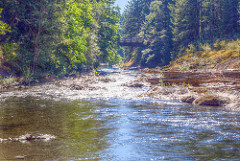
We’ve written a lot about the need for our communities to adapt to climate change. Less has been said about the ways that we can assist natural ecosystems in adapting to climate change, but a decision last May by the BC Environmental Appeal Board was a good first step in helping the Cowichan River, and its fish and communities, adapt to climate change. A belated congratulations to the Cowichan Watershed Board and their lawyer, Krista Robertson, who intervened in the appeal in support of the fish, with support from our Environmental Dispute Resolution Fund (EDRF).
The State of the Cowichan River
Cowichan residents have witnessed in dismay the once healthy Cowichan River diminished to a stream. Low water levels and drought conditions have made it difficult for chinook salmon to complete their spring run up to Cowichan Lake. In 2012 members of the Cowichan Tribes and others actually had to catch and transport salmon up the river when the levels of water in the river dropped.
The community has known for some time that climate change is affecting the river flows – reducing them by over a third on average. A 2007 report on preparing for climate change recommended raising the level of a weir at Cowichan Lake that controls the release of water out of the lake, which would allow water flow in the Cowichan River to be maintained at critical times of the year.
In 2012, the Cowichan Watershed Board (CWB), an organization created by the Cowichan Tribes and local municipalities, approached the EDRF for funding to work with a lawyer to examine options to negotiate or require the storage of sufficient water forfish, with a focus on raising the weir.
While there continue to be obstacles to raising the weir, in May 2013 the Deputy Comptroller of Water Rights ordered that Catalyst Paper, which owns the weir, adopt a new approach to the control and release of water through the weir, to provide more water for fish.
The Appeal
Although the new approach might be better for fish, some of the landowners around the lake were concerned that higher water levels would affect their properties. Six individuals appealed the order to the BC Environmental Appeal Board (EAB). The CWB, with EDRF support, applied for, and received, participant status in the appeals, which were heard together in 2014.
In addition to being represented by Krista Robertson of JFK Law, the CWB also hired a hydraulic engineer as an expert witness.
In May 2015, the Environmental Appeal Board upheld the new operating regime, and dismissed the appeals. The EAB explained:
The Panel accepts that a minimum water flow in the Cowichan River of 7.08 cms, as required by the Storage Licences, is essential to the maintenance of downstream values; specifically, it is essential to the maintenance of a healthy fish population in the Cowichan River, and a healthy fish habitat along the river. …The Panel finds that the downstream benefits to supporting Catalyst’s Diversion Licence, the benefits to fish and fish habitat, as well as the benefits to other water licensees and water well users along the Cowichan River, are legitimate values to be considered by the Panel when evaluating the reasonableness of the Order.
CWB Coordinator Rodger Hunter reports that:
[T]he Province did not call expert witnesses, and a great deal of misinformation was put forward. We would not have done well without legal and expert representation. We are very grateful for the support that we have received from West Coast Environmental Law’s Environmental Dispute Resolution Fund.
First steps
Very often a win is just a step in a journey. In the case of the Cowichan River, the new rules for the release of water from Cowichan Lake will help fish in the river in an era of climate change, but to date the weir has not been raised. Concerns about fish and about water flows were obvious this year, when the long, hot summer caused water levels in the river to drop sharply.
But at least a first step has been taken, and a precedent established. We hope that the Cowichan Watershed Board, and others in the area, are successful in future steps as well.
By Andrew Gage, Staff Counsel and Barb Everdene, EDRF Manager
Photo by Russell McNeil, used under Creative Commons Licence.